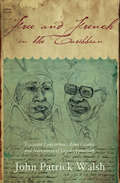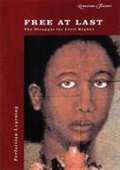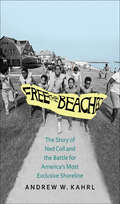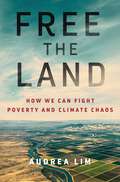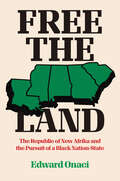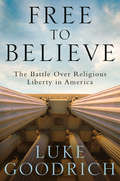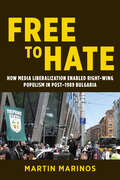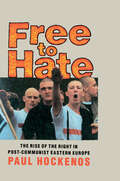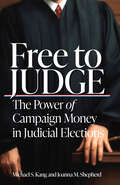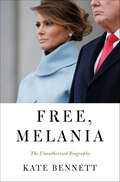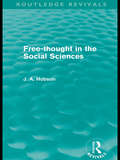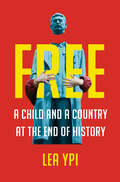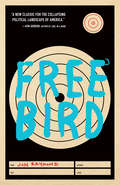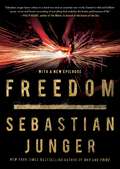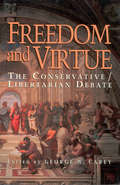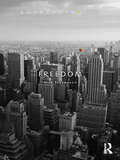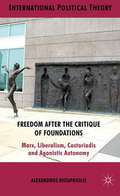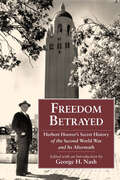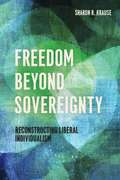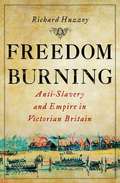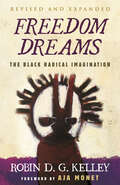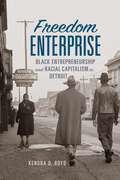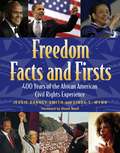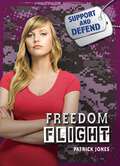- Table View
- List View
Free and French in the Caribbean: Toussaint Louverture, Aimé Césaire, and Narratives of Loyal Opposition (Blacks in the Diaspora)
by John Patrick Walsh&“All the ingredients to become the next important book in the field of postcolonial studies with the emphasis on French Caribbean culture and literature.&”—Daniel Desormeaux, University of Chicago In Free and French in the Caribbean, John Patrick Walsh studies the writings of Toussaint Louverture and Aimé Césaire to examine how they conceived of and narrated two defining events in the decolonializing of the French Caribbean: the revolution that freed the French colony of Saint-Domingue in 1803 and the departmentalization of Martinique and other French colonies in 1946. Walsh emphasizes the connections between these events and the distinct legacies of emancipation in the narratives of revolution and nationhood passed on to successive generations. By reexamining Louverture and Césaire in light of their multilayered narratives, the book offers a deeper understanding of the historical and contemporary phenomenon of &“free and French&” in the Caribbean. &“A fruitful intervention in a growing body of literature and increasingly lively debate on the Haitian Revolution and the figure of Toussaint Louverture, the book also contributes to the emerging scholarship on Césaire, Francophone literature, and postcolonial theory.&”—Gary Wilder, CUNY Graduate Center &“A valuable contribution to both the rapidly proliferating literature on the Haitian Revolution and the emerging revisionist appreciation of Césaire&’s intellectual and political project.&”—Small Axe &“J.P. Walsh has produced for the nonspecialist reader an excellent analysis of the historiographical discourse on Toussaint Louverture and Aimé Césaire with a focus on the meaning(s) of decolonization in the late eighteenth and mid-twentieth centuries.&”—New West Indian Guide &“That Free and French inspires so many questions is testament to its ambition, the provocative parallel at its heart, and the richness of Walsh&’s analysis.&”—H-Empire
Free at Last, The Struggle for Civil Rights
by Perfection Learning CorporationA collection of short stories, poems, biographical accounts, and essays about the struggle for civil rights that address the question, "How do we achieve the ideal of equal rights for all?"
Free the Beaches: The Story of Ned Coll and the Battle for America's Most Exclusive Shoreline
by Andrew W. Kahrl“A well-documented—and dispiriting—history of prejudice and inequality . . . An unsparing exposé of white supremacy among Northern elites.” —Kirkus ReviewsDuring the long, hot summers of the late 1960s and 1970s, one man began a campaign to open some of America’s most exclusive beaches to minorities and the urban poor. That man was anti-poverty activist and one-time presidential candidate Ned Coll of Connecticut, a state that permitted public access to a mere seven miles of its 253-mile shoreline. Nearly all of the state’s coast was held privately, for the most part by white, wealthy residents.This book is the first to tell the story of the controversial protester who gathered a band of determined African American mothers and children and challenged the racist, exclusionary tactics of homeowners in a state synonymous with liberalism. Coll’s legacy of remarkable successes—and failures—illuminates how our nation’s fragile coasts have not only become more exclusive in subsequent decades but also have suffered greater environmental destruction and erosion as a result of that private ownership.Winner of the Homer D. Babbidge Award, sponsored by the Association for the Study of Connecticut HistoryWinner of the 2019 Connecticut Book Awards, non-fiction category, sponsored by Connecticut Center for the Book“This is a life story brimming with humanity and a great antidote to life under global capitalism, in which privatization is all the rage. Andrew Kahrl’s book is sure to have a sorely needed humanizing effect on all its readers.” —Ted Steinberg, award-winning author of Gotham Unbound: The Ecological History of Greater New York
Free the Land: How We Can Fight Poverty and Climate Chaos
by Audrea LimAn eye-opening examination of how treating land as a source of profit has a massive impact on racial inequality and the housing, gentrification, and environmental crises.Climate change, gentrification, racial inequity, and corporate greed are some of the most urgent problems facing our society. They are traditionally treated as unrelated issues, but they all share a common root: the commodification of land. Environmental journalist Audrea Lim began to notice these connections a decade ago when she reported on the Native communities leading the fight against oil mining on their lands in the Canadian tar sands near her hometown of Calgary, but before long, she saw the essential role of land commodification and private ownership everywhere she looked: in foreclosure-racked suburbs and gentrifying cities like New York City; among poor, small farmers struggling to keep their businesses afloat; and in low-income communities attempting to resist mines and industrial development on their lands, only to find that their voices counted less than those of shareholders living thousands of miles away.Free The Land is a captivating and beautifully rendered look at the ways that our relationship to the land is the core cause of the most pressing justice issues in North America. Lim expertly weaves together seemingly disparate themes into a unified theory of social justice, describes how the land ownership system developed over the centuries, and presents original reporting from a wide range of activists and policy makers to illustrate the profound impact it continues to have on our society today.Ultimately, this book offers a message of hope: by approaching these socioeconomic issues holistically, we can begin to imagine just alternatives to fossil-fueled capitalism, new ways to build community, and a more sustainable, equitable world.
Free the Land: The Republic of New Afrika and the Pursuit of a Black Nation-State (Justice, Power, and Politics)
by Edward OnaciOn March 31, 1968, over 500 Black nationalists convened in Detroit to begin the process of securing independence from the United States. Many concluded that Black Americans' best remaining hope for liberation was the creation of a sovereign nation-state, the Republic of New Afrika (RNA). New Afrikan citizens traced boundaries that encompassed a large portion of the South--including South Carolina, Georgia, Alabama, Mississippi, and Louisiana--as part of their demand for reparation. As champions of these goals, they framed their struggle as one that would allow the descendants of enslaved people to choose freely whether they should be citizens of the United States. New Afrikans also argued for financial restitution for the enslavement and subsequent inhumane treatment of Black Americans. The struggle to "Free the Land" remains active to this day. This book is the first to tell the full history of the RNA and the New Afrikan Independence Movement. Edward Onaci shows how New Afrikans remade their lifestyles and daily activities to create a self-consciously revolutionary culture, and argues that the RNA's tactics and ideology were essential to the evolution of Black political struggles. Onaci expands the story of Black Power politics, shedding new light on the long-term legacies of mid-century Black Nationalism.
Free to Believe
by Mary Anne WaldronFree to Believe investigates the protection for freedom of conscience and religion - the first of the "fundamental freedoms" listed in the Canadian Charter of Rights and Freedoms - and its interpretation in the courts. Through an examination of decided cases that touches on the most controversial issues of our day, such as abortion, same-sex marriage, and minority religious practices, Mary Anne Waldron examines how the law has developed in the way that it has, the role that freedom of conscience and religion play in our society, and the role it could play in making it a more open, peaceful, and democratic place.While the range of cases explored will be of interest to scholars, Free to Believe is also written in an accessible style, with legal terms and concepts explained for those who wish to learn accurate, detailed information about the impact of the law on contemporary social policy issues. As such, this book widens the debate about this fundamental freedom and the influence of public opinion on what is often a misrepresented and misunderstood issue.
Free to Believe: The Battle Over Religious Liberty in America
by Luke GoodrichA leading religious freedom attorney, the veteran of several Supreme Court battles, helps people of faith understand religious liberty in our rapidly changing culture—why it matters, how it is threatened, and how to respond with confidence and grace. Many Americans feel like their religious freedom is under attack. They see the culture changing around them, and they fear that their beliefs will soon be punished as a form of bigotry. Others think these fears are overblown and say Christians should stop complaining about imaginary persecution. In Free to Believe leading religious freedom attorney Luke Goodrich challenges both sides of this debate, offering a fresh perspective on the most controversial religious freedom conflicts today. With penetrating insights on gay rights, abortion rights, Islam, and the public square, Goodrich argues that threats to religious freedom are real—but they might not be quite what you think. As a lawyer at the Becket Fund for Religious Liberty, Goodrich has won several historic Supreme Court victories for clients such as the Little Sisters of the Poor and Hobby Lobby. Combining frontline experience with faithful attention to Scripture, Goodrich shows why religious freedom matters, how it is threatened, and how to protect it. The result is a groundbreaking book full of clear insight, practical wisdom, and refreshing hope for all people of faith.
Free to Hate: How Media Liberalization Enabled Right-Wing Populism in Post-1989 Bulgaria (Geopolitics of Information)
by Martin MarinosLinking neoliberalism with the Right’s global rise Bulgaria’s media-driven pivot to right-wing populism parallels political developments taking place around the world. Martin Marinos applies a critical political economy approach to place Bulgarian right-wing populism within the structural transformation of the country’s media institutions. As Marinos shows, media concentration under Western giants like Westdeutsche Allgemeine Zeitung and News Corporation have led to a neoliberal turn of commercialization, concentration, and tabloidization across media. The Right have used the anticommunism and racism bred by this environment to not only undermine traditional media but position their own outlets to boost new political entities like the nationalist party Ataka. Marinos’s ethnographic observations and interviews with local journalists, politicians, and media experts add on-the-ground detail to his account. He also examines several related issues, including the performative appeal of populist media and the money behind it. A timely and innovative analysis, Free to Hate reveals where structural changes in media intersect with right-wing populism.
Free to Hate: The Rise of the Right in Post-Communist Eastern Europe
by Paul HockenosCombining first-hand reporting, original documentation, and political analysis, Free to Hate is the first major work in English to investigate the rise of the ultra-nationalist and radical right-wing movements that have been sweeping Central and Eastern Europe since 1989. In this powerful volume, Paul Hockenos provides an account of the emergence and contemporary relevance of far right movements in countries including Germany, Hungary, Romania, and Poland. In addition, he discusses neo-Nazi youth subculture, anti-Semitism, racism, minority issues, and the revision of history in the post-communist states.
Free to Judge: The Power of Campaign Money in Judicial Elections
by Michael Kang Joanna ShepherdThe idea that wealthy people use their money to influence things, including politics, law, and media will surprise very few people. However, as Michael S. Kang and Joanna Shepherd argue in this readable and rich study of the state judiciary, the effect of money on judicial outcomes should disturb and anger everyone. In the current system that elects state judges, the rich and powerful can spend money to elect and re-elect judges who decide cases the way they want. Free to Judge is about how and why money increasingly affects the dispensation of justice in our legal system, and what can be done to stop it. One of the barriers to action in the past has been an inability to prove that campaign donations influence state judicial decision-making. In this book, Kang and Shepherd answer that challenge for the first time, with a rigorous empirical study of campaign finance and judicial decision-making data. Pairing this with interviews of past and present judges, they create a compelling and persuasive account of people like Marsha Ternus, the first Iowa state supreme court justice to be voted out of office after her decision in a same-sex marriage case. The threat of such an outcome, and the desire to win reelection, results in judges demonstrably leaning towards the interests and preferences of their campaign donors across all cases. Free to Judge is thus able to identify the pieces of our current system that invite bias, such as judicial reelection, and what reforms should focus on. This thoughtful and compellingly written book will be required reading for anybody who cares about creating a more just legal system.
Free, Melania: The Unauthorized Biography
by Kate BennettThe first behind-the-scenes look at the life of the most enigmatic First Lady in US history.Melania Trump is an enigma. Regardless of your political leanings, she is fascinating—and one of the most groundbreaking First Ladies in history. A former model who speaks five languages, her upbringing in a former communist country spurred a relentless drive for stability. A reluctant pillar in a controversial presidential administration, she ran the East Wing like none of her predecessors ever could. But who is she really?In Free, Melania we get an insider’s look at Melania Trump, from her childhood in Slovenia to her days in the White House, and everything in between. We get a behind-the-scenes look at her relationship with Donald, and her role in Trump family dynamics, including her strained relationship with Ivanka. We get a rare glimpse into her famous clothing choices (including the message behind her controversial jacket, “I Really Don’t Care, Do U?”, worn on a visit to the US-Mexico border), and how a publicly quiet Melania actually speaks very loudly—if you just know where, and how, to listen.
Free-Thought in the Social Sciences (Routledge Revivals)
by J. A. HobsonThis Routledge Revival sees the reissue of a seminal work by British economist, sociologist and academic John A. Hobson, elucidating his views on a variety of topics across the social sciences. He makes particular reference to the struggle between the disinterested urge of the social scientist and the interests and other motive forces which tend to influence and mould his processes of inquiry. The work is split into three parts, focussing upon free-thinking, economics and political ethics respectively.
Free: A Child and a Country at the End of History
by Lea YpiShortlisted for the 2021 Baillie Gifford Prize for Non-Fiction Shortlisted for the 2021 Costa Biography Award The Sunday Times Best Book of the Year in Biography and Memoir A Financial Times Best Book of 2021 (Critics' Picks) The New Yorker, Best Books We Read in 2021 Times Literary Supplement Book of the Year 2021 A Guardian Best Book of the Year A reflection on "freedom" in a dramatic, beautifully written memoir of the end of Communism in the Balkans. For precocious 11-year-old Lea Ypi, Albania’s Soviet-style socialism held the promise of a preordained future, a guarantee of security among enthusiastic comrades. That is, until she found herself clinging to a stone statue of Joseph Stalin, newly beheaded by student protests. Communism had failed to deliver the promised utopia. One’s “biography”—class status and other associations long in the past—put strict boundaries around one’s individual future. When Lea’s parents spoke of relatives going to “university” or “graduating,” they were speaking of grave secrets Lea struggled to unveil. And when the early ’90s saw Albania and other Balkan countries exuberantly begin a transition to the “free market,” Western ideals of freedom delivered chaos: a dystopia of pyramid schemes, organized crime, and sex trafficking. With her elegant, intellectual, French-speaking grandmother; her radical-chic father; and her staunchly anti-socialist, Thatcherite mother to guide her through these disorienting times, Lea had a political education of the most colorful sort—here recounted with outstanding literary talent. Now one of the world’s most dynamic young political thinkers and a prominent leftist voice in the United Kingdom, Lea offers a fresh and invigorating perspective on the relation between the personal and the political, between values and identity, posing urgent questions about the cost of freedom.
Freebird
by Jon Raymond"Freebird is such a timely book. considering the current deep divisions between right and left. A new classic for the collapsing political landscape of America."--Kim Gordon, author of Girl in a Band The Singers, an all-American family in the California style, are about to lose everything. Anne is a bureaucrat in the Los Angeles Office of Sustainability whose ideals are compromised by a proposal from a venture capitalist seeking to privatize the city’s wastewater. Her brother, Ben, a former Navy SEAL, returns from Afghanistan disillusioned and struggling with PTSD, and starts down a path toward a radical act of violence. And Anne’s teenage son, Aaron, can’t decide if he should go to college or pitch it all and hit the road. They all live inside the long shadow of the Singer patriarch Grandpa Sam, whose untold experience of the Holocaust shapes his family’s moral character to the core. Jon Raymond, screenwriter of the acclaimed films Meek’s Cutoff and Night Moves, combines these narrative threads into a hard-driving story of one family’s moral crisis. In Freebird, Raymond delivers a brilliant, searching novel about death and politics in America today, revealing how the fates of our families are irrevocably tied to the currents of history.
Freedom
by Sebastian JungerA profound rumination on the concept of freedom from the New York Times bestselling author of Tribe.Throughout history, humans have been driven by the quest for two cherished ideals: community and freedom. The two don&’t coexist easily. We value individuality and self-reliance, yet are utterly dependent on community for our most basic needs. In this intricately crafted and thought-provoking book, Sebastian Junger examines the tension that lies at the heart of what it means to be human. For much of a year, Junger and three friends—a conflict photographer and two Afghan War vets—walked the railroad lines of the East Coast. It was an experiment in personal autonomy, but also in interdependence. Dodging railroad cops, sleeping under bridges, cooking over fires, and drinking from creeks and rivers, the four men forged a unique reliance on one another. In Freedom, Junger weaves his account of this journey together with primatology and boxing strategy, the history of labor strikes and Apache raiders, the role of women in resistance movements, and the brutal reality of life on the Pennsylvania frontier. Written in exquisite, razor-sharp prose, the result is a powerful examination of the primary desire that defines us.
Freedom & Virture
by George W. CareyIdeas about the nature of liberty and a normative moral tradition lie at the heart of many contemporary political controversies. Because they are concerned with core principles, these debates can be vigorous and highly charged. Nowhere has this been more evident in our time than in the lively exchanges between conservatives and libertarians. Like no other single work, Freedom and Virtue explores what unites and divides the adherents of these two important American traditions--shedding much light on our current political landscape.
Freedom (Shortcuts)
by Nick StevensonFreedom is commonly recognized as the struggle for basic liberties, societies based upon open dialogue, human rights and democracy. The idea of freedom is central to western ideas of modernity, but this engaging, accessible book argues that if we look back at the history of the idea of freedom, then what we mean by it is far more contested than we might think. To what extent does freedom have a ‘social’ component, and how is it being reshaped by our dominant consumer society? This book represents a wake-up call to all those who thought our basic ideas of freedom were settled. Today, the West sees itself as having a crucial role to play in exporting freedom into the far regions of the world – but our own freedom seems more under threat than ever. Linking ideas of public and personal freedom, Stevenson explores complaints about ‘big brother’, the arrival of the business society and the erosion of democracy to show how our freedoms are far from secure. Seeking to affirm the importance of freedom, this book provides a compelling argument for linking it to other values such as equality and responsibility. Drawing upon a range of critical thinkers and perspectives, Stevenson asks what freedom will come to mean in the future, in a world that seems increasingly fragile, uncertain and insecure.
Freedom After the Critique of Foundations: Marx, Liberalism, Castoriadis and Agonistic Autonomy (International Political Theory)
by Alexandros KioupkiolisAn exploration of the contemporary re-conception of freedom after the critique of objective truths and ideas of an unchanging human nature, in which modern self-determination was grounded. This book focuses on the radical theorist Cornelius Castoriadis and the new paradigm of 'agonistic autonomy' is contrasted with Marxian and liberal approaches.
Freedom Betrayed: Herbert Hoover's Secret History of the Second World War and Its Aftermath
by George H. NashHerbert Hoover's "magnum opus"—at last published nearly fifty years after its completion—offers a revisionist reexamination of World War II and its cold war aftermath and a sweeping indictment of the "lost statesmanship" of Franklin Roosevelt. Hoover offers his frank evaluation of Roosevelt's foreign policies before Pearl Harbor and policies during the war, as well as an examination of the war's consequences, including the expansion of the Soviet empire at war's end and the eruption of the cold war against the Communists.
Freedom Beyond Sovereignty: Reconstructing Liberal Individualism
by Sharon R. KrauseWhat does it mean to be free? We invoke the word frequently, yet the freedom of countless Americans is compromised by social inequalities that systematically undercut what they are able to do and to become. If we are to remedy these failures of freedom, we must move beyond the common assumption, prevalent in political theory and American public life, that individual agency is best conceived as a kind of personal sovereignty, or as self-determination or control over one’s actions. In Freedom Beyond Sovereignty, Sharon R. Krause shows that individual agency is best conceived as a non-sovereign experience because our ability to act and affect the world depends on how other people interpret and respond to what we do. The intersubjective character of agency makes it vulnerable to the effects of social inequality, but it is never in a strict sense socially determined. The agency of the oppressed sometimes surprises us with its vitality. Only by understanding the deep dynamics of agency as simultaneously non-sovereign and robust can we remediate the failed freedom of those on the losing end of persistent inequalities and grasp the scope of our own responsibility for social change. Freedom Beyond Sovereignty brings the experiences of the oppressed to the center of political theory and the study of freedom. It fundamentally reconstructs liberal individualism and enables us to see human action, personal responsibility, and the meaning of liberty in a totally new light.
Freedom Burning
by Richard HuzzeyAfter Britain abolished slavery throughout most of its empire in 1834, Victorians adopted a creed of "anti-slavery" as a vital part of their national identity and sense of moral superiority to other civilizations. The British government used diplomacy, pressure, and violence to suppress the slave trade, while the Royal Navy enforced abolition worldwide and an anxious public debated the true responsibilities of an anti-slavery nation. This crusade was far from altruistic or compassionate, but Richard Huzzey argues that it forged national debates and political culture long after the famous abolitionist campaigns of William Wilberforce and Thomas Clarkson had faded into memory. These anti-slavery passions shaped racist and imperialist prejudices, new forms of coerced labor, and the expansion of colonial possessions. In a sweeping narrative that spans the globe, Freedom Burning explores the intersection of philanthropic, imperial, and economic interests that underlay Britain's anti-slavery zeal- from London to Liberia, the Sudan to South Africa, Canada to the Caribbean, and the British East India Company to the Confederate States of America. Through careful attention to popular culture, official records, and private papers, Huzzey rewrites the history of the British Empire and a century-long effort to end the global trade in human lives.
Freedom Dreams (TWENTIETH ANNIVERSARY EDITION): The Black Radical Imagination
by Robin D. KelleyThe 20th-anniversary edition of Kelley&’s influential history of 20th-century Black radicalism, with new reflections on current movements and their impact on the author, and a foreword by poet Aja MonetFirst published in 2002, Freedom Dreams is a staple in the study of the Black radical tradition. Unearthing the thrilling history of grassroots movements and renegade intellectuals and artists, Kelley recovers the dreams of the future worlds Black radicals struggled to achieve.Focusing on the insights of activists, from the Revolutionary Action Movement to the insurgent poetics of Aimé and Suzanne Césaire, Kelley chronicles the quest for a homeland, the hope that communism offered, the politics of surrealism, the transformative potential of Black feminism, and the long dream of reparations for slavery and Jim Crow.In this edition, Kelley includes a new introduction reflecting on how movements of the past 20 years have expanded his own vision of freedom to include mutual care, disability justice, abolition, and decolonization, and a new epilogue exploring the visionary organizing of today&’s freedom dreamers.This classic history of the power of the Black radical imagination is as timely as when it was first published.
Freedom Enterprise: Black Entrepreneurship and Racial Capitalism in Detroit (American Business, Politics, and Society)
by Kendra D. BoydTraces the rise and fall of the historic Black business community in DetroitThe Great Migration saw more than six million African Americans leave the US South between 1910 and 1970. Though the experiences of migrant laborers are well-known, countless African Americans also left the South to pursue entrepreneurial opportunities and viewed business as key to Black liberation. Detroit’s status as a mecca for Black entrepreneurship illuminates this overlooked aspect of the Great Migration story. In Freedom Enterprise, Kendra D. Boyd uses “migrant entrepreneurship” as a lens through which to understand the entwined histories of Black-owned business, racial capitalism, and urban space.Freedom Enterprise follows Black Southerners’ journeys to Detroit during the initial wave of migration in the 1910s and 1920s, through their efforts to build a prosperous Black business community in the 1930s and 1940s, to the destruction of that community through urban renewal projects and freeway construction in the 1950s and 1960s. Combining business and social history methods to analyze an eclectic archive, Boyd chronicles migrant entrepreneurs’ experiences, highlighting tales of racial and economic violence, Black women’s business organizing, illegal business, communist entrepreneurs, and cooperative economics.Boyd uses the framework of racial capitalism to examine migrant entrepreneurs’ experiences in twentieth-century America. In the Jim Crow South, African Americans worried about white mobs taking away their property, wealth, and lives. Though they sought refuge in Detroit, migrant entrepreneurs subsequently faced the loss of their livelihoods and the businesses they had spent decades building to the bulldozers of state-sponsored urban redevelopment initiatives. Southern migrants’ “freedom enterprise”—their undertaking of attaining freedom through business—was curtailed by the reality of operating within the confines of US racial capitalism.In tracing Black entrepreneurs across the Great Migration, Freedom Enterprise provides important insights into African Americans’ activism for racial and economic justice and continued racialized wealth disparities.
Freedom Facts and Firsts
by Linda T Wynn Jessie Carney SmithSpanning nearly 400 years from the early abolitionists to the present, this guide book profiles more than 400 people, places, and events that have shaped the history of the black struggle for freedom. Coverage includes information on such mainstay figures as Martin Luther King Jr., Malcolm X, and Rosa Parks, but also delves into how lesser known figures contributed to and shaped the history of civil rights. Learn how the Housewives' League of Detroit started a nationwide movement to support black businesses, helping many to survive the depression; or discover what effect sports journalist Samuel Harold Lacy had on Jackie Robinson's historic entrance into the major leagues. This comprehensive resource chronicles the breadth and passion of an entire people's quest for freedom.
Freedom Flight (Support and Defend)
by Patrick JonesHaving a parent return from military duty is a dream come true. But sometimes, coming home comes with problems. When Paige's mom returns from her final tour of Air Force duty, Paige couldn't be happier for things to go back to normal. But before long, Paige realizes her mom brought something else back with her—an addiction to pain pills. The irritable, medicated, zombie version of her mom isn't the person Paige wanted to come home. She'll try anything to get through to her mom and help her with her painful secret. But can Paige get her mom clean without ruining their relationship and her own ROTC dreams?
